2019-06-09, Deutschlandfunk, by N. N.
[Talk about the “Alcina” production with minimal sound clips, including a tiny excerpt of “Verdi Prati”.]
Source/Listen to Podcast: [x]

Press Archive
2019-06-09, Deutschlandfunk, by N. N.
[Talk about the “Alcina” production with minimal sound clips, including a tiny excerpt of “Verdi Prati”.]
Source/Listen to Podcast: [x]
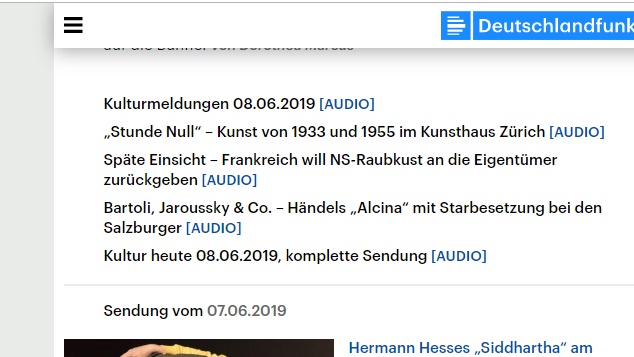
2019-06-07, Philippe Jaroussky on Facebook
“Première dans moins de 2h! Première in less than 2 hours !!!!”
Source/Read more: [x]
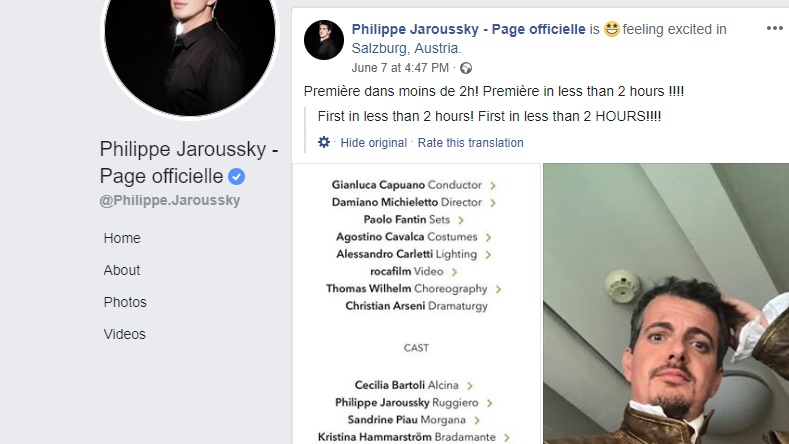
2019-06-07, Forumopera, by Guillaume Saintagne
Il se permet une ribambelle de variations d’une finesse rare, parfaitement exécutées, sur un souffle inextinguible pour « Sta nell’ircana », et va chercher des notes graves en voix de poitrine, comme il y a dix ans, tout en se montrant toujours aussi attentif au jeu d’acteur.
Source/Read more: [x]
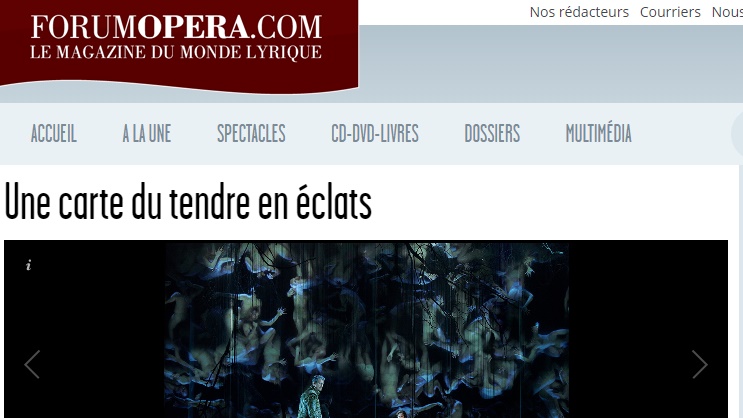
2019-06-07, 3sat, by N. N.
“Alcina” bei den Pfingstfestspielen
Cecilia Bartoli, künstlerische Leiterin der Salzburger Pfingstfestspiele, hat ein Programm zusammengestellt, bei dem Barockmusik und Kastraten Thema sind. Wir schauen auf Händels “Alcina”.
Source/Watch video/Read more: [x]
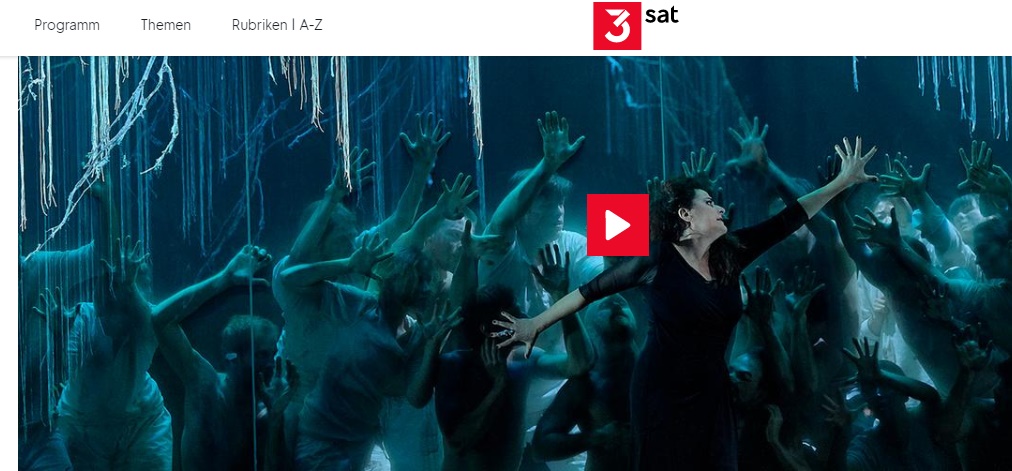
2019-06-07, BR Klassik, by Volkmar Fischer
Unter den schönsten der vielen schönen Arien in Händels “Alcina” sind die meisten von langsamen Tempi gezeichnet, von wundersam gewölbten Gesangslinien, die sich mit großer Ruhe entfalten. Dort zeigt Händel seine wahre Größe: Wo er Tonfolgen leise anstimmen und ruhevoll ausschwingen lässt. […]
Source/Read more: [x]
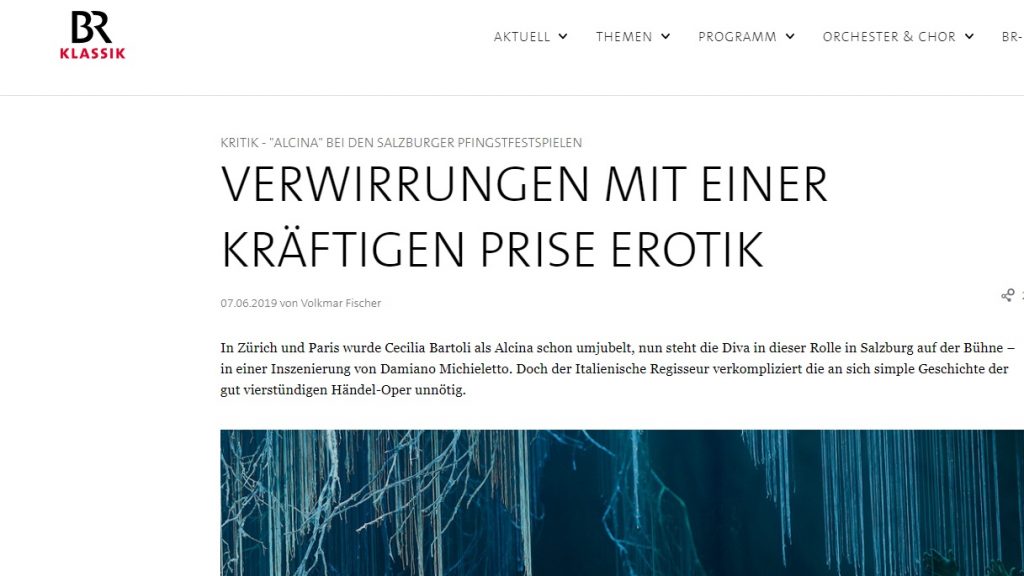
2019-06-07, ORF, ZIB 1
Information | ZIB 1
“Himmlische Stimmen” bei Salzburger Pfingstfestspielen
“Voci celesti” – “himmlische Stimmen” – ist das Motto der Salzburger Pfingstfestspiele, die am Freitag mit “Alcina” beginnen. Im Mittelpunkt des Festivals steht Musik, die für Kastraten geschrieben wurde.
Source/Watch video: [x]

2019-05-14, Philippe Jaroussky on Facebook
“Chers tous , merci du fond du cœur d’être aussi nombreux à me suivre sur ma page Facebook !” […]
Source/Read more: [x]

2019-05-14, Philippe Jaroussky on Facebook
“Chers tous , merci du fond du cœur d’être aussi nombreux à me suivre sur ma page Facebook !” […]
Source/Read more: [x]
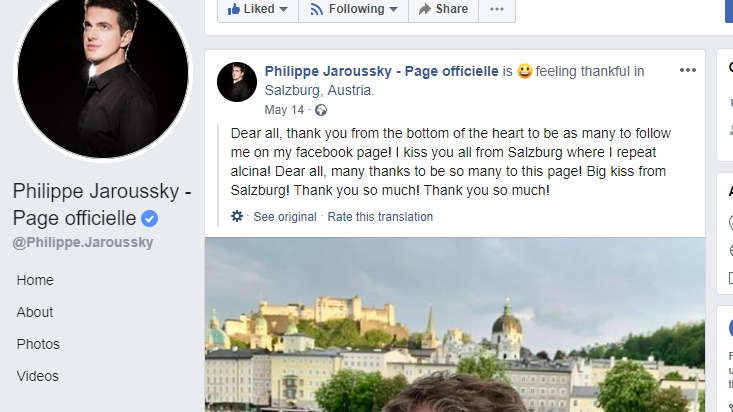
2019-05, apa (Österreichische Presseagentur), erschienen in/published by Kleine Zeitung, stol.it, Salzburger Nachrichten, ORF et al.
“Die Inszenierung wird mit dem 44-jährigen Starregisseur Damiano Michieletto ein Landsmann der quirligen Römerin übernehmen, wobei Frau Intendantin mit Philippe Jaroussky als Ruggiero und Sandrine Piau als Morgana weitere Größen der Zunft verpflichtet hat. Unter der Leitung von Gianluca Capuano spielt mit den Musiciens du Prince Monaco das von Bartoli 2016 ins Leben gerufene Orchester.” […]
Source/Read more: [x]
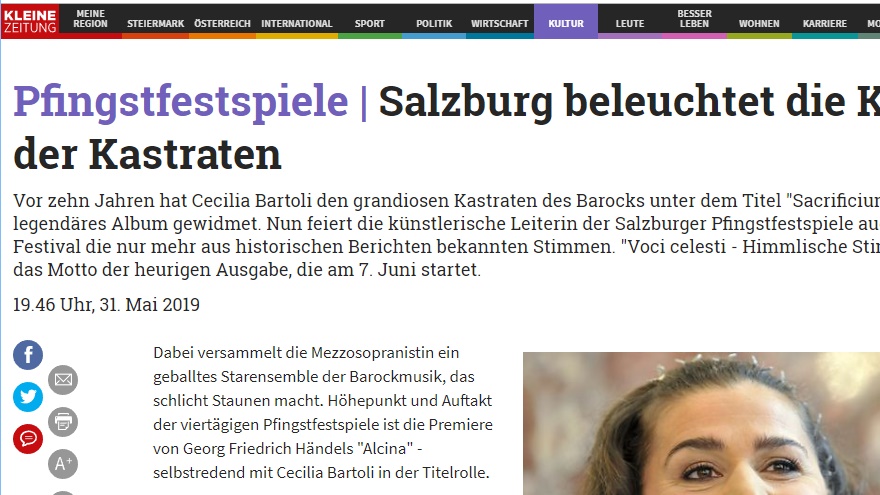
2018-08-01, Salzburger Nachrichten, by n. A.
[…]
Der Franzose hat sich zu einem Midas unter den Countertenören emporgesungen: Was er angreift, wird zu Gold. Über die irdischen Klippen virtuosester Koloraturen und heikler Sprünge erhaben, vermag er etwa den Zorn des Sesto in „Giulio Cesare in Egitto“ ebenso plastisch nachzuzeichnen wie das Glück des frischverliebten Ariodante. Seine größte Stärke offenbart sich jedoch, wenn er in Trauergesängen von epischer Länge – wie in “Scherza infida” – seine ganze Ausdruckspalette entfalten kann. Vokallinien, die Zeit und Raum außer Kraft setzen. Und das Publikum im Haus für Mozart hält den Atem an.
Source/Read more: [x]
This is a fan translation; no infringement of copyright is intended. We believe it fulfills the criteria for “fair use,” discussion and study. Translation by *L
Salzburger Nachrichten 1 Aug. 2018
SALZBURG. Orpheus mourns his Eurydice: “Ho perso il caro ben,” he sings. “I lost my dear beloved.” There sound starts out like that of an angel. However, it doesn’t remain rigid; trandescending, within seconds, it blooms, and gaining volume, it fills all of the concert hall. All is shifting and scintillating. The introverted grief has found a vent. How Philippe Jaroussky creates that specific moment tells a lot about his art. The Frenchman has sung his way up to become a Midas among countertenors: everything he touches turns into gold. Sublimely beyond all earthly rocks such as coloraturas or tricky interval jumps, he is capable of sculpting Sesto’s ire from “Giulio Cesare in Egitto” just as the happiness of Ariodante’s who just fell fell in love.
However, it is in laments of epic proportions that his his greatest asset becomes apparent; that is when he gets a chance to use his whole palette of expressions, just as as in “Scherza infida.” Vocal lines that seem to suspend time and space – and the audience at the Haus für Mozart holds its breath. In this concert hall that is acoustically the most suited for Baroque, Jaroussky opened the sequence of recitals at the Salzburg Festival on Monday. Agreed, “recital” is an understatement when considering the scenic quality of the interpretation of arias by George Friedrich Händel. The Ensemble Artaserse cushions Jaroussky’s expeditions into the realm of the soul on its vibrant sound rich in in contrasts.
Historically informed performances can be engaging, if musicians – standing or not – seem on the edge of their seats, bringing a maximum of energy into the mix. Rocking spiccati, saturated, groovy off-beats – everything’s there.
And then, there is Emöke Baráth, a partner on equal terms. The Hungarian soprano is blessed with a timbre particularly suited for Baroque music that is dark in color but light as feather at the same time. At Almira’s Aria “Geloso tormento,” she completely takes back her voice, reaching regions free from any corporeality. We are listening to a queen’s inner monologue. She is powerful; however, she cannot overcome her own tormenting jealousy.
In Händel’s duets, the art of the two exceptional voices raises to higher power. At the end of a short, joint tour of Central Europe, Jaroussky’s and Baráth’s synchronicity can hardly be topped. Two voices merge as one, becoming a single, sensually charged sound – even in the brilliant “Vivo in te mio caro bene” at the end of the encores after two and a half hours. *) Barath storms off stage; Jaroussky smirks triumphantly. The audience is raging.
*) [translator’s note: “Vivo in te” is one of the greatest love duets of all time. Asteria and Andronico are incarcerated, and, ….. But I digress! However, it wasn’t the last encore.]
Source/Read more: [x]